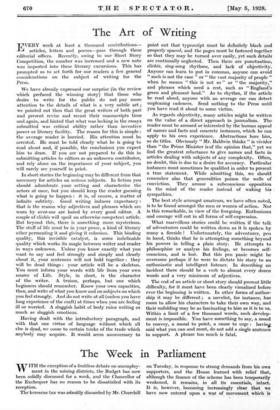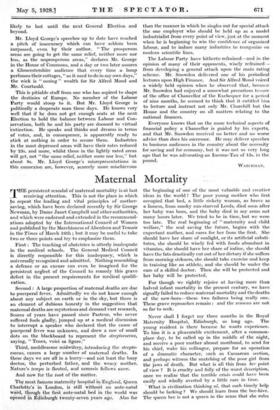The Week in Parliament
WITH the exception of a fruitless debate on unemploy- ment in the mining districts, the Budget has now been solidly discussed for a week, and the Chancellor of the Exchequer has no reason to be dissatisfied with its reception.
The kerosene tax was adroitly discarded by Mr. Churchill on Tuesday, in response to strong demands from his own supporters, and the House learned with relief that, although the finance of the scheme has been temporarily weakened, it remains, in all its essentials, intact. It is, however, becoming increasingly clear that we have now entered upon a war of movement which is likely to last until the next General Election and beyond.
Mr. Lloyd George's speeches up to date have reached a pitch of inaccuracy which can have seldom been 'surpassed, even by their author. " The prosperous areas are going to get the same relief, neither more nor less, as the unprosperous areas," declares Mr. George in the House of Commons, and a day or two later assures a Gloucestershire audience that every time a lamp 'perfumes their cottages, " as it used to do in my own days," the wick is " oozing " wealth for Sir Alfred Mond and Mr. Courtauld.
This is pitiable stuff from one who has aspired to shape the destinies of Europe. No member of the Labour Party would stoop to it. But Mr. Lloyd George is politically a desperate man these days. He knows very well that if he does not get enough seats at the next Election to hold the balance between Labour and Con- servatism, both he and his party are doomed to virtual extinction. He speaks and thinks and dreams in terms of votes, and, in consequence, is apparently ready to stick at nothing in order to secure them. Industries in the most depressed areas will have their rates reduced by 25s. and more, whilst those in the lightly rated areas will get, not " the same relief, neither more nor less," but about 9s. Mr. Lloyd George's misrepresentations in this connexion are, however, scarcely more mischievous than the manner in which he singles out for special attack the one employer who should be held up as a model industrialist from every point of view, just at the moment when lie is beginning to win the confidence of organized labour, and to induce many industries to reorganize on modern scientific lines.
The Labour Party have hitherto refrained—and in the opinion of many of their opponents, wisely refrained— from developing a general attack upon the main rating scheme. Mr. Snowden delivered one of his periodical lectures upon High Finance. And Sir Alfred Mond voiced a widely held opinion when he observed that, because Mr. Snowden had enjoyed a somewhat precarious tenure of the office of Chancellor of the Exchequer for a period of nine months, he seemed to think that it entitled him to lecture and instruct not only Mr. Churchill but the House and the country on all matters relating to the national finances.
Everyone knows that on the more technical aspects of financial policy a Chancellor is guided by his experts, and that Mr. Snowden received no better and no worse advice than does his successor. He may deliver speeches to business audiences in the country about the necessity for:saving and for economy, but it was not so very long ago that he was advocating an Income-Tax of 15s. in the pound.
WATCHMAN.









































 Previous page
Previous page